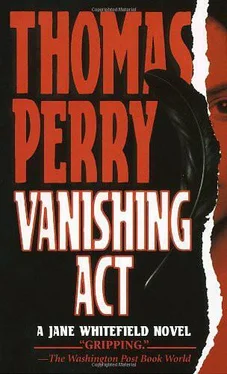She sidestepped along the aisle inside the plane, past people stowing things in the overhead compartments and taking off coats, and sat down beside him. When the plane had bumped along up the runway and taken off, he leaned close to her and said, "They have very clean restrooms in Canada."
"Lucky you," she said.
"Why Vancouver?"
"For the next few hours, we eat, sleep, watch a movie, read magazines, whatever. We don’t talk."
"Not even about Vancouver?"
"No."
"Come on. Is there somebody on the plane who doesn’t know where it’s going?"
She smiled. "Please. Just do what I ask. It’ll be better."
"Will you make it up to me?"
"No."
"How about a neutral topic? Is that where Harry is?"
"Harry’s not a neutral topic."
Over the Great Plains she fell asleep. She slept without moving, simply fell into the darkness and stayed there until people started ignoring the pilot’s recitation of the rules about not standing up until the plane had stopped at the terminal.
Jane opened her eyes to see Felker watching her.
In the terminal, she hurried him to the baggage area without speaking. She was still watchful, but things had changed. She was no longer expecting to see the four men. Whatever had been chasing Felker hadn’t gotten big enough yet to send hundreds of watchers to all of the major airports on the continent, but soon it might. She just hoped that his boss hadn’t gotten tired of calling his answering machine by now. When he did, Felker could be on the list of people that the F.B.I., Interpol, and lots of local police would be watching for. Accountants who embezzled money from clients traveled.
When they made it out of the baggage area, she took a deep breath. It was late afternoon here, and the air was damp and fresh and cool. The airport was on an island, clutched between the two arms of the Fraser River, with the Strait of Georgia to the west. The first taxi in line pulled to the curb and the driver got out while the trunk popped open.
"Going to town?" he asked. He was short and blond and red-faced.
"Yes," said Jane. "The Westin Hotel."
The man snatched up the bags and set them in the trunk while Jane and Felker climbed inside. The cab pulled into traffic and took the route north on Granville Street. Jane stared out the window at the city. She liked being in a car, away from the lighted glass enclosure of the terminal.
When the taxi stopped at the hotel, she handed the driver one of the Canadian twenties she had picked up in Brantford. They let the bellman scoop up their bags and lead them to the front desk.
"Dr. and Mrs. Wheaton," said Jane, obliterating Janet and Daniel Foley. Everything was little jumps to make breaks in the trail. Never use the same name on the airline ticket and the hotel register. Never miss a chance to mislead.
"Yes," said the desk clerk, plucking a white card out of a box behind the desk with her long, manicured fingers. "We have your reservation right here."
Felker signed the card, and the desk clerk handed the keys to the bellman, who pushed a tall cart ahead of them with their bags on it, using it like a moving barricade to shield them all the way to the elevator. He opened the door for them and bustled around, switching lights on and off just long enough for Jane to slip Felker some money and for Felker to pass it to the bellman.
Everything was quick, smooth, and private. That was another part of the method. You used the facilities that had been invented to insulate the people who had a little money from the rough edges and annoyances. The Dr. Wheatons of the world didn’t have to wait for buses or stand in lines. They stepped out of one enclosure into another. For them waiting was irritating. For the John Felkers of the world it was dangerous.
Felker flopped backward onto the bed and stared up at the ceiling. "Now I can ask, can’t I?"
"Ask what?" Jane crawled onto the bed next to him.
"Why Vancouver?"
"We’re here because this is where a man named Lewis Feng is. He’s the best."
’’The best what?"
"He’s the one I sent your pictures to."
"What’s he doing here?"
She sat up and looked down at him. ’’The people who need the best American passports and licenses and things aren’t in the United States. They’re on the outside looking in."
"Who are they?"
"Right now what’s driving this market is China," she said. ’’There are a lot of rich people in Hong Kong who don’t think it’s going to be a great place to be rich when the British lease runs out. Some are setting up to move to other places, maybe sending a couple of members of the family to establish residency, set up bank accounts, that sort of thing."
"So why do they need fake papers? A person with serious money can still buy a congressman and get real papers."
"Some of the richest probably do. A billionaire doesn’t have any trouble getting in anywhere, but then there’s family, retainers, friends, and if you’ve lived through, say, sixty years of Chinese history, you get used to the idea that governments change their minds fast. So a lot of them are hedging their bets, setting up a second place they can run to if the door closes, a second identity if the first one doesn’t hold up. The same thing is happening in Taiwan and Singapore. A lot of people who have made a lot of money in the past twenty years don’t want to bet their lives that China is always going to leave them alone, either."
"So all of a sudden Vancouver is the best place to get forged American papers?"
She shook her head. "God, no. Just one of the places. There’s Miami, where you have refugees, drug runners, and prospective revolutionaries, or ones who already tried and blew it. L.A. is the big money-laundering center now, and that means bagmen have to bring it in, and others have to get enough I.D. to do a lot of banking and buying. And New York, just because it’s New York and it’s still the best place to buy anything you want."
"That’s where we were heading, wasn’t it? New York."
"Yes. That was before." She didn’ tsay before what.
"Why didn’t we just fly there?"
"This is safer for you."
"Why?"
"Because Lew Feng has a very specialized clientele. A lot of them may be gangsters, but if they are, they’re from Shanghai or someplace, not St. Louis. That means they aren’t interested in you and they don’t know anybody else who is. In New York I can’t guarantee that."
"All right," said Felker. "What do we do now?"
"I go out and make some more arrangements, buy you some clothes. You’re going to stay here, out of sight."
"How long?"
"We meet Lew Feng tomorrow night."
17
It was a small shop on a quiet block, the third in a row of seven narrow painted fronts, each with a single door and a small display case full of expensive knitted clothes, ivory carvings, furs, or leather. The sign over the door said WESTMINSTER STATIONERS. When Jane pushed the door open, a small bell attached to a spring on top tinkled for a few, seconds, then rang again when Felker closed it. On all of the shelves were neat displays of boxed stationery, open stocks of vellum and linen, hand-pressed paper of silk threads and cotton, and colored inks and pens for calligraphers, artists, and architects.
Jane stood still in the middle of the room in front of the video camera so she could be recognized on the monitor, and in a moment Lewis Feng appeared. He was about six feet tall and very slim, dressed in a dark suit and a shirt so white and starched that it seemed to belong on the shelves with the paper. "Hello, Jane," he said.
"Hi, Lew," she answered.
"Come in." The way he said it told Felker that this was only an anteroom.
He led them into an office that looked like a doctor’s consulting room. He went behind his desk while Jane and Felker waited, then opened a filing cabinet and pulled out a key. He used it to open another door, which led into a large workshop with dozens of pieces of equipment, a few of which Felker recognized. There were a light table, an enlarger, engraving machines, even an old-fashioned printing press. Felker understood. A stationer could have an incredible collection of printing equipment and special papers without anybody giving it a thought. Lew Feng noticed that Felker was looking around, and said, "The foundation of our relationship is our mutual lack of curiosity."
Читать дальше












